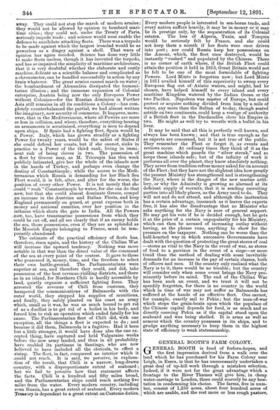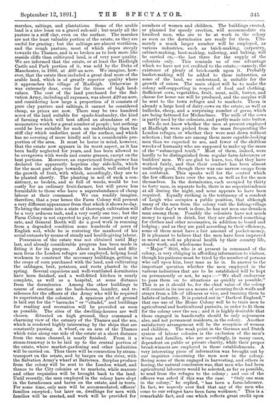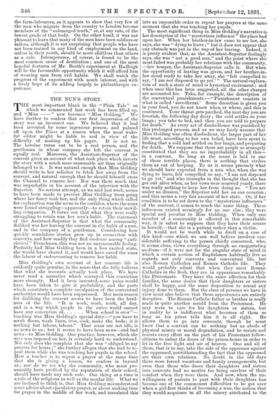GENERAL BOOTH'S FARM. COLONY. G ENERAL BOOTH is fond of forlorn-hopes,
and the first impression derived from a walk over the land which he has purchased for his Farm Colony near Leigh, in Essex, is that he has unnecessarily undertaken a great deal of up-hill work through a mistaken selection. Indeed, if it were not for the great advantage which a frontage to the River Thames will give him, in cheap water-carriage to London, there could scarcely be any hesi- tation in condemning his choice. The farms, five in num- ber, consist of 1,250 acres, about four- hundred acres of which are arable, and the rest more or less rough pasture, marshes, saltings, and plantations. Some of the arable land is a nice loam on a gravel sub-soil ; but nearly all the pasture is a stiff clay, even on the surface. The marshes are not the least valuable portion of the estate, as they are useful for grazing ; but the saltings are almost worthless, and the rough pasture, most of which slopes steeply towards the Thames, and is so broken as to look more like seaside cliffs than cultivated land, is of very poor quality. We are informed that the estate, or at least the Hadleigh Castle and Park portion of it, was sold by the Duke of Manchester, in 1866, at £60 an acre. We imagine, how- ever, that the estate then included a great deal more of the arable land, which is of greatly superior quality where it approaches the village of -Hadleigh. Otherwise it was extremely dear, even for the times of high land- values. The cost of the land purchased for the Sal- vation Army, including all expenses, was about £20 an acre, and considering how large a proportion of it consists of pure clay pasture and saltings, it cannot be considered cheap, as prices are now. There may be two hundred acres of the land suitable for spade-husbandry, the kind of farming which will best afford an abundance of re- munerative work for a great number of people ; but nothing could be less suitable for such an undertaking than the stiff clay which undeilies most of the surface, and which has no covering of more kindly soil in a considerable pro- portion of the area. It must be borne in mind, however, that the estate now appears in its worst aspect, as it has been badly neglected for years, and has been allowed to be overgrown with weeds and coarse grasses, except on the best portions. Moreover, an experienced fruit-grower has declared the apparently hopeless clay side-hills, which for the most part slope towards the south, well suited for the growth of fruit, with which, accordingly, they are to be planted shortly. The planting in soil of such a con- sistency, so broken, and so full of weeds, would be too costly for an ordinary fruit-farmer, but will prove less formidable to those who have a superabundance of cheap labour at their command. We can readily imagine, therefore, that a year hence the Farm Colony will present a very different appearance from that which it shows to-day. To bring the estate into a state of thorough cultivation will be a very arduous task, and a very costly one too; but the Farm Colony is not expected to pay, for some years at any rate, and General Booth will do a good work in rescuing from a degraded condition some hundreds of acres of English soil, while he is restoring the manhood of his social outcasts by means of steady and health-giving labour.
Possession of the estate was not obtained until May last, and already considerable progress has been made in fitting it for its purpose. About a hundred and fifty men from the London refuges are employed, helping local workmen to construct the necessary buildings, getting in the crops of corn purchased with the land, and cultivating the cabbages, beet, potatoes, and roots planted in the spring. Several capacious and well-ventilated dormitories have been finished, and a well-fitted kitchen is nearly complete, as well as a hospital, at some distance from the dormitories. Among the other buildings in course of erection are the bath-house, laundry, and re- sidences for the officers of the Army who will be required to superintend the colonists. A spacious plot of ground is laid out for the " barracks " or " citadel,' and buildings for reading and recreation will be provided as soon as possible. The sites of the dwelling-houses are well chosen. Situated on high ground, they command a charming view of the estuary of the Thames and the sea, which is rendered highly interesting by the ships that are constantly passing. A wharf, on an arm of the Thames which runs along one side of the estate at a short distance from the main channel, is nearly finished. From it a steam-tramway is to be laid up to the central portion of the estate, where market-gardening and other industries will be carried on. Thus there will be connection by steam- transport on the estate, and by barges on the river, with the Salvation Army's wharf at Battersea. Surplus produce from the colony will be sent to the London wharf, and thence to the City colonies or to markets, while manure and other requisites will be brought back to the land. Until recently, the men employed in the colony have slept in the farmhouses and barns on the estate, and in tents. For some time, only men will be accommodated, officers' families excepted; but later on, dwellings for men with families will be erected, and work will be provided for numbers of women and children. The buildings erected, or planned for speedy erection, will accommodate six hundred men, who are to be at work in the colony as soon as the dormitories are ready for them. Ulti- mately a much larger number will be employed, as various industries, such as brick-making, carpentry, cabinet-making, boot-making, tailoring, and baking, will be carried on,—the last three for the supply of the colonists only. This reminds us of one advantage which we have not yet credited to the estate,—namely, the existence of plenty of brick-earth upon it. Probably basket-making will be added to these industries, as some of the land, we understand, is suitable for the growth of osiers. The main object will be to make the colony self-supporting in respect of food and clothing. Sufficient corn, vegetables, fruit, meat, milk, butter, and cheese for home use will be produced, and the surplus will be sent to the town refuges and to markets. There is already a large herd of dairy-cows on the estate, as well as bullocks, sheep, and a surprising number of geese, which are being fattened for Michaelmas. The milk of the cows is partly used by the colonists, and partly made into butter. We do not know whether the men at present employed at Hadleigh were picked from the mass frequenting the London refuges, or whether they were sent down without selection ; but there are among them more capable-looking men than we expected to see, and fewer of the shiftless wrecks of humanity who are supposed to make up the mass of the " submerged tenth." Most of them, indeed, were hardly to be distinguished from regular farm-labourers or builders' men. We are glad to learn, too, that they have worked fairly, and that their conduct has been almost uniformly good, though there was one narrow escape from an outbreak. This speaks well for the control which the few officers have over the men, as well as for the men themselves. In • the dormitories, each occupied by thirty to forty men, in separate beds, there is no superintendence at all during the night, and none appears to have been required. Equally striking is the testimony of a resident of Leigh who occupies a public position, that although many of the men from the colony visit the fishing-village after their day's work is done, he has not seen one drunken. man among them. Possibly the colonists have not much money to spend in drink, but they are allowed something. for clothes and other necessaries, in addition to board and lodging ; and as they are paid according to their efficiency, some of them must have a fair amount of pocket-money. It is pleasant to believe that the men have been improved in moral as well as physical health by their country life, steady work, and wholesome food.
"Major" Stitt, who is at present in command of the colony, is very obliging in affording information to visitors, though his patience must be tried by the number of persons who call upon him, busy man as he is. In answer to the important question whether the men employed in the various industries that are to be established will be kept on permanently or not, he says :—" We shall endeavour to pass them on to situations as quickly as possible." This is as it should be, for the chief value of the colony will consist in its use as a means of securing fresh waifs and strays from a life of idleness or vice, and training them to habits of industry. It is pointed out in " Darkest England," that one use of the Home Colony will be to train men to agricultural and horticultural pursuits, in order to fit them for the colony over the sea ; and it is highly desirable that those engaged in handicrafts should be only sojourners also, and not permanent residents, in the colony. Another satisfactory arrangement will be the reception of women and children. The weak point in the German and Dutch system of labour colonies is the exclusion of the men's wives and families, who are accordingly, in many cases, dependent on public or private charity, while their proper bread-winners are employed in those establishments. A very interesting piece of information was brought out by our inquiries concerning the men now in the colony. Seeing some of them engaged in harvesting, and others in hoeing, the natural conclusion was, that men who had been agricultural labourers would be selected, as far as possible, to send from the refuges to the colony ; and one of the officers was asked if this was the case. " Only one man in the colony," he replied, " has been a farm-labourer. In fact, we scarcely ever find that any of the men who come to our refuges have been farm workmen." This is a remarkable fact, and one which reflects great credit upon the farm-labourers, as it appears to show that very few of the men who migrate from the country to London become members of the " submerged tenth," or, at any rate, of the lowest grade of that body. On the other hand, it was not pleasant to learn that many of the men have been soldiers or sailors, although it is not surprising that people who have not been trained in any kind of employment on the land, unless in their youth, should be more shiftless than others as a rule. Intemperance, of course, is found to be the most common cause of destitution ; and one of the most hopeful features of Mr. Booth's experiment at Hadleigh will be the favourable opportunity which it will afford him of weaning men from evil habits. We shall watch the progress of the experiment with much interest, and with a lively hope of its adding largely to philanthropic ex- perience.




































 Previous page
Previous page